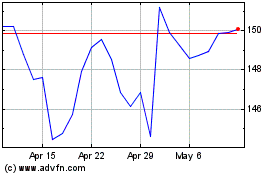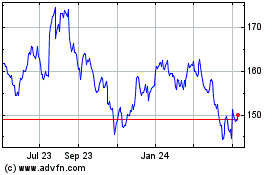By Peter Loftus
CHICAGO -- Cancer researchers see promise in giving patients
combinations of multiple drugs that are proving more effective than
one or two. But the strategy poses a dilemma for health insurers
and patients: even higher prices.
Researchers said at a medical meeting here Sunday that adding a
third drug, Johnson & Johnson's Darzalex, to an older two-drug
combination for patients with the blood cancer multiple myeloma
significantly slowed cancer growth compared with the older two-drug
combination alone in a clinical trial.
But the combined cost of the drugs -- based on current list
prices and the dosing schedule used in the study -- would be at
least $180,000 for the first full year of treatment for the average
patient. Darzalex, which was introduced last year, costs about
$134,550 for the first year and $76,050 each year thereafter, a
J&J spokesman said.
High prices for new cancer drugs and repeated increases for some
older ones have sparked criticism from doctors, patients and
insurers, who say the costs are straining budgets and often seem
unrelated to how well the drugs work. The spread of combination
treatments threatens to heighten this tension.
"We have to think about if the benefit from combination
therapies is worth the cost," Daniel Goldstein, a medical
oncologist at Rabin Medical Center in Israel, said in an interview
at the annual meeting of the American Society of Clinical Oncology
in Chicago.
Steve Pearson, president of the Institute for Clinical and
Economic Review, a nonprofit that assesses the cost-effectiveness
of drugs, suggested drug companies work together to offer "group
discounts" on all drugs in a combination regimen. This would allow
combination treatments to meet cost-effective targets without
requiring only the newest addition to offer a big discount, he
said.
Some drug makers, including Roche Holding AG, say they would
consider discounts on combinations, but say there are challenges in
the U.S. because the health-insurance system is fragmented. J&J
said it couldn't project pricing for the Darzalex-containing
combination, which hasn't been approved by U.S. regulators.
Much of the push for combinations centers on a new wave of drugs
that harness the body's immune system to fight cancer, including
Merck & Co.'s Keytruda and Bristol-Myers Squibb Co.'s Opdivo,
each of which costs more than $12,500 a month.
Initially, these drugs were approved for use as single agents,
based on clinical trials showing they prolonged survival or shrank
tumors in a significant percentage of patients.
But many patients haven't benefited from the drugs, prompting
researchers to test them in combination with other medications,
including different immunotherapies, chemotherapy or drugs that
target genetic mutations.
Keytruda is being tested in various combinations with more than
50 other drugs while Opdivo is being tested with about 40 other
drugs, according to Evaluate Ltd., a drug-industry research firm.
Roche Holding's Genentech unit, which recently began selling the
immunotherapy Tecentriq, is running about 50 clinical trials of
combinations of two or more cancer drugs, Chief Medical Officer
Sandra Horning said in an interview.
Daniel O'Day, CEO of Roche's pharmaceuticals unit, said the
company has discussions with health insurers "to move to a system
where we can get combination-based pricing in the U.S." A Roche
spokeswoman said the company priced its breast-cancer drug Perjeta
lower than many other new cancer drugs because the company knew it
would be used in combination with its older breast-cancer drug
Herceptin.
Robert Vonderheide, a cancer researcher at the University of
Pennsylvania, said in an ASCO presentation that the choices of
drugs to test in combination were "dizzying." But he added, "Can we
afford it given the cost of these drugs?"
Last year, the U.S. Food and Drug Administration approved the
first immunotherapy combination, Bristol-Myers' Opdivo and Yervoy,
to treat melanoma. It costs more than $250,000 a patient for the
first full year of treatment.
AbbVie Inc. and its partner companies are testing a combination
of the drugs Imbruvica and Venclexta to treat a form of leukemia.
For their currently approved uses, Imbruvica costs at least
$116,000 a year and Venclexta costs $109,500 for the first year of
treatment.
In an interview, AbbVie Chief Executive Richard Gonzalez
acknowledged the high cost of multidrug combinations. "In the grand
scheme of things, it's worth it" if they lead to cures or long
remissions, he said. An AbbVie spokesman said the
Imbruvica-Venclexta combination is in early clinical studies, and
that no cost has been set.
The new study of J&J's Darzalex included nearly 500 patients
whose multiple myeloma had worsened despite at least one prior
treatment with other drugs. About half were given the drugs Velcade
and dexamethasone. The other half were given Darzalex in
combination with those drugs.
The addition of Darzalex reduced the risk of disease progression
or death by about 61% versus the older treatment, at a median
follow-up period of about 7 1/2 months after the start of
treatment. Side effects associated with the Darzalex-containing
regimen included blood-platelet deficiency and anemia.
Velcade is co-marketed by Takeda Pharmaceuticals International
Co. and J&J, and dexamethasone is a generic drug available from
multiple companies. In the study, patients stopped taking Velcade
after six months of treatment. A six-month supply costs about
$45,000, a Takeda spokeswoman said. Patients took Darzalex until
their disease worsened.
Ron Winslow contributed to this article.
Write to Peter Loftus at peter.loftus@wsj.com
(END) Dow Jones Newswires
June 05, 2016 12:07 ET (16:07 GMT)
Copyright (c) 2016 Dow Jones & Company, Inc.
Johnson and Johnson (NYSE:JNJ)
Historical Stock Chart
From Mar 2024 to Apr 2024

Johnson and Johnson (NYSE:JNJ)
Historical Stock Chart
From Apr 2023 to Apr 2024
